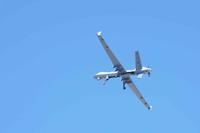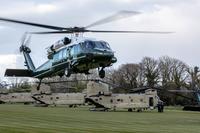For the first time ever, military schools have begun enrolling students for a new, full-day universal prekindergarten program.
The new Department of Defense Education Activity pre-K program is set to start at the beginning of next school year with enrollment and has long been sought by military families, especially those with two working parents, including dual-military couples. Now, 80 of 90 DoDEA schools will host the universal program, with enrollment opened for school starting this fall.
"It really adds a lot more into the support we can provide to military families," Will Griffin, the communications director for DoDEA, told Military.com in an interview Thursday.
Read Next: 'Restore Real Value': House Panel Wants to Give Junior Enlisted Troops 15% Pay Raise
Pre-K is already offered at some DoD schools, but not everywhere. In many cases, when it is offered, the program allows only half-day enrollment, leaving many working parents to come up with alternative child care solutions.
The initiative, fueled by $94 million in a defense spending bill passed by Congress last month, is open to all children eligible to attend DoDEA schools who will be 4 years old by Sept. 1. It will follow the widely used early childhood development "Creative Curriculum."
The program is set to open after undergoing a successful pilot program last year at an elementary school at Marine Corps Air Station Iwakuni, Japan, Griffin said.
The 10 schools that will not offer universal pre-K are in the process of undergoing significant renovations or new construction to accommodate future students, Griffin said, adding that DoD schools must adhere to certain facility requirements for hosting elementary school students.
Those schools include four elementary schools at Fort Campbell, Kentucky; one at Fort Novosel, Alabama; and five additional schools across Europe, including four in Germany and one in Kleine Brogel, Belgium.
The schools that will offer universal pre-K will begin the program 10 days after the start of the regular school year for older students. Griffin said the delayed start will allow additional time for pre-K teacher professional development, and will let teachers and families schedule one-on-one meetings to help children ease into the change.
The DoDEA expects numbers of pre-K enrollment to closely match kindergarten enrollment, which currently hovers around 6,000 students, Griffin said, adding that the bulk of military students are youngsters enrolled in pre-K through fifth grade.
DoDEA is working to add 500 jobs to support the program, including 250 teachers and 250 teaching aides. The student-to-teacher ratio for the program is set at 18 students for every one teacher, with a teaching aide. Teaching aides are "paraprofessionals" and are not required to have a teaching degree or license.
Roughly 80% of new pre-K staff have been hired so far, Griffin said.
Details on the delayed school openings and student registration can be found on the DoDEA website. Registration is open and will not close, though early enrollment is encouraged.
Related: DoD Schools Roll Out New 'Gender-Neutral' Dress Code for Students












